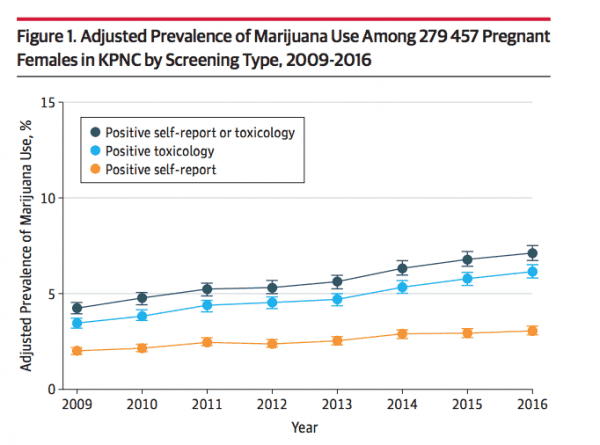
Soon after Amy Smith* started thinking about having a baby a few years ago, she wondered what she’d do about her marijuana habit.
Smith had deployed twice with the US Army, and had returned from Iraq with severe post-traumatic stress disorder. At one point, her doctors at the VA had her taking 22 pills to help her sleep and quell her depression and anxiety.
Then she discovered marijuana. Smith went off all the prescription medication and began self-medicating by smoking cannabis. “It was amazing — how it helped me get out of bed. I wasn’t terrified of being at the grocery store anymore. I wasn’t on the verge of losing my mind.” (A resident of Utah, the drug only became legal for medical use this November.)
In 2014, Smith became pregnant with her first child. And after Googling studies about the risks, “dancing around the topic” with her doctor, and having many long and difficult discussions with her husband, she decided to use marijuana 4 to 5 times per week while pregnant and while breastfeeding.
“When my anxiety showed up when I was pregnant, I knew what I was in for,” she said. “I could pile up the medications [and] eventually end up in hospital. I chose marijuana instead.”
The marijuana landscape is rapidly changing in the US. Weed has been legalized in 32 states for medical purposes, in 10 states plus DC for recreational use, and cannabis is being marketed directly to pregnant women for morning sickness. And now more and more women are grappling with the question Smith faced: whether to use while pregnant.
The American College of Obstetricians and Gynecologists advises doctors to screen for marijuana use in pregnant women and encourage users to quit — even in cases when weed is being used for medicinal purposes — while carrying and breastfeeding.
“There are many concerns about prenatal marijuana use and the potential for adverse effects on the fetus,” said researcher Kelly Young-Wolff of the Kaiser Permanente Northern California Division of Research. “And although the health effects of prenatal cannabis use are complex and not well understood, no amount of cannabis has been shown to be safe during pregnancy.”
Despite that, Smith is part of a growing, but still small, group of women who are opting in. Aside from her husband, she just hasn’t told a soul about it because, according to her, “It’s too much of a risk socially and legally.”
Marijuana use among pregnant women in California doubled between 2009 and 2016
There’s no official screening system at the state or federal level for marijuana use in pregnancy in the US. And in many states, substance use during pregnancy is sufficient to make a child abuse or neglect report.
California a rare exception. And the best evidence on marijuana use while carrying a baby comes from Kaiser Permanente Northern California: It’s the only large health care system in the US that screens all pregnant women for prenatal marijuana use as part of standard prenatal care by urine toxicology and self-report. This means they have an objective way to measure whether it’s increasing or decreasing instead of relying solely on women’s self-reports.
In a study of that data, by Young-Wolff and her colleagues at Kaiser, they found a near doubling in the percentage of pregnant women who screen positive for marijuana use by self-report and/or a positive toxicology test between 2009 and 2016, from 4 percent to 7 percent.
Notably, the prevalence of marijuana use in their hospital system was nearly twice as high by toxicology testing versus what women reported to their doctors, suggesting that it’s probably more common during pregnancy than many people admit.

Weed was especially popular among younger moms: 22 percent of pregnant women under the age of 18, and 19 percent aged 18 to 24 years, screened positive for marijuana use in 2016, which shows that the younger generation may rely more heavily on marijuana during pregnancy. And Young-Wolff says the data from her hospital system reflects the national survey data we have on marijuana use during pregnancy, which also shows it’s going up.
It seems like this shift has something to do with with the swift changes in marijuana law and culture in recent years. In the November midterms alone, three more states decided to legalize recreational or medical weed. And dispensaries in places where weed is legal often market it directly at pregnant women. In a recent study on recommendations to pregnant women at Colorado cannabis dispensaries, researchers found the majority (69 percent) peddled products to treat morning sickness, and 36 percent told women the drug is safe to use in pregnancy.
Another study by Young-Wolff’s team at Kaiser Permanente found pregnant women with severe nausea and vomiting had four times greater odds of marijuana use than women without a nausea and vomiting diagnosis — though it wasn’t clear whether their morning sickness led them to use weed or weed exacerbated their morning sickness.
Either way, the marketing materials on cannabis products often omit an important point, Young-Wolff said: There’s a lot we don’t understand about marijuana’s health effects generally — and, in particular, on moms and babies, including the drug’s potential risks in pregnancy.
The hazy evidence on smoking weed in pregnancy
Since the late 1980s, researchers have known that THC — the active ingredient in cannabis — can cross the placenta and reach the fetus. More recently, researchers have found that THC is also secreted in breast milk up to six days after the last use. So that means the fetus is exposed to THC, and the concerns about marijuana’s health effects during pregnancy and lactation stem mainly from this fact.
One of the best summaries of the evidence on the health effects of cannabis comes from a major report out of the National Academies of Sciences, Engineering, and Medicine. More than a dozen experts reviewed more than 10,000 studies published between 1999 and 2016. (Most of the data in the review focused on smoked marijuana.)
Overall, the report suggested weed shows promise for chronic pain, multiple sclerosis, and cancer patients — but it also complicated the narrative that weed is a safe drug. The report found that it may increase the risk of respiratory problems (when smoked), schizophrenia and psychosis, getting into car accidents, and lagging social achievement. The report also uncovered pregnancy-related problems. In particular, the strongest link they uncovered showed that babies exposed to cannabis in utero tended to have lower birth weights.
“But what we couldn’t say is whether that’s a direct effect of marijuana or of smoking,” explained Marie Clare McCormick, a professor of maternal and child health at Harvard and chair of the National Academy of Sciences (NAS) committee that put out the report. The researchers noted that the marijuana birth weight findings were consistent with the effects of cigarette smoking on fetuses. McCormick explained that smoking any substance increases carbon monoxide in the blood, which reduces blood’s oxygen-carrying capacity, so not as much gets to the baby.
Help our reporting on pregnancy
Are you pregnant? Have you ever been pregnant? Or do you work with pregnant women? We’re reporting on pregnancy for a series here at Vox and we’d love to hear from you. Please check out this survey for Vox.
“Clearly you can say, ‘Don’t smoke during pregnancy no matter what you’re smoking.’” But for the remainder, it’s the precautionary principle: Until we know more you probably shouldn’t do it,” McCormick summed up.
The NAS report drilled down into other health effects during pregnancy, like whether the babies of moms who used marijuana are more likely to wind up in the NICU or experience sudden infant death syndrome and cognitive and academic achievement challenges later in life. And on these important questions, it was equivocal: The researchers found “limited, insufficient, or no evidence.”
Still, the American College of Obstetricians and Gynecologists say that there are no approved indications or recommendations regarding prenatal marijuana use — even though the impact of prenatal cannabis use isn’t yet fully understood.
Even so, Young-Wolff said. “[There’s] sufficient evidence [of] an association between prenatal marijuana use and lower offspring birth weight, and limited research shows a correlation with some developmental delays or difficulties with executive functioning in the child — like problems with impulse control and attention.” And that’s enough to make health professionals wary.
Why marijuana bump science is so shaky
There are a few reasons why the research base on marijuana in pregnancy is so limited and inconclusive. Again, most of the evidence we have on weed’s health impact on the fetus comes from research on smoking — and there are many different ways people ingest cannabis nowadays, through edibles, oils, and vape devices to name just a few.
The THC content in weed has also shot up dramatically, which means it may be riskier to use while pregnant. So, as Young-Wolff of Kaiser told me, “A lot of the research that has been done is quite old” and doesn’t reflect the current marijuana landscape or the THC levels in today’s products.
The studies out there also tend to be small, without enough statistical power to accurately detect relationships; they often rely on self-reported data, which is flawed when it comes to substance use. A lot of the research also didn’t control for “confounding factors” or all the non-weed variables that may bias the results of studies.
“Pregnant marijuana users often use other drugs in pregnancy,” Young-Wolff explained, “and prior studies haven’t been able to differentiate which effects are due to marijuana or other drugs they may be using.”
Finally, the federal government still classifies marijuana as a Schedule 1 substance — the same legal and regulatory league as heroin — and that means researchers need to jump through all kinds of hoops to run studies.
The National Academies called for these restrictions to be relaxed so we can get a better understanding of the effects of marijuana in all kinds of different vulnerable groups. Erin Parker,* another weed-smoking mom, agreed. “I think it’s absurd to be passing laws making a drug legal and not having research on whether or not it’s safe for pregnant women.”
“They just need to reschedule [weed] so that it can be researched,” Smith reiterated. “If medical research came out and told me there were significant risks to my kids’ long-term health and development, I would listen to that research. But for now, like mothers have done since the beginning of time, I’m doing the best I can.”
*These names have been changed to protect the identity of the women.
Sourse: vox.com






